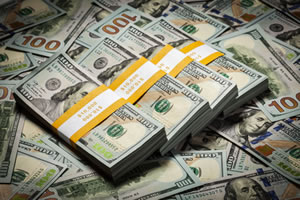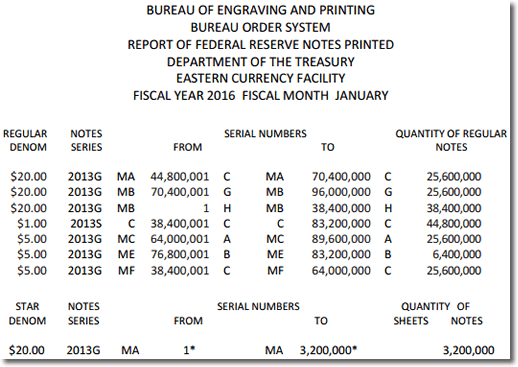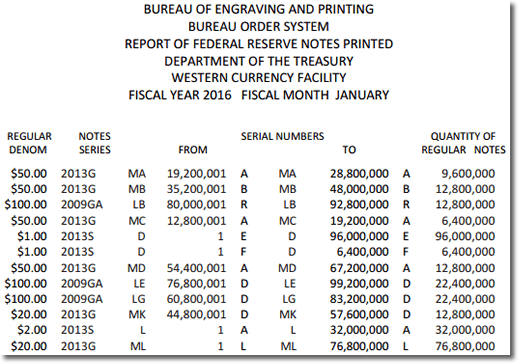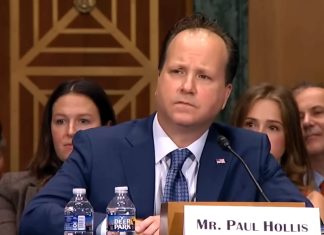 U.S. money production in January picked up from December and a year earlier, data from the agency responsible for printing currency shows.
U.S. money production in January picked up from December and a year earlier, data from the agency responsible for printing currency shows.
518.4 million in $1s, $2s, $5s, $20s, $50s and $100s were produced last month, accounting for a combined value of nearly $12 billion, according to the latest figures from the Bureau of Engraving and Printing (BEP). These figures compare to December totals of over 462 million notes worth more than $11.8 billion.
In percentage comparisons from December to January, the BEP made 12.2% more banknotes for a modest 1% higher total value. In other monthly differences, there were:
- 321.1% more $2s;
- 28.6% more $5s;
- 9.6% more $20s;
- 44.4% more $50s; and
- 14.3% fewer $100s.
The number of $1s was the same for both months. Similarly, both months lacked $10s. Before then, $10s had been printed monthly since May 2014.
Compared to the January 2015, the number of notes jumped 15.4% from 449,104,000 and their combined value soared 90.9% from $6,278,480,000.
Below are images of the BEP’s latest monthly production report. They show the type of banknotes manufactured at the agency’s two printing facilities.
January 2016 BEP Banknote Production
Facility at Washington, DC

Facility at Fort Worth, TX

The BEP printed 3.2 million in $20 star note. Star notes are replacements for misprinted or damaged notes and for certain serial numbers like 000 000 000. Star notes have serial numbers that end with a star "*" designation, and are also so indicated by quantities in the images above. Money collectors usually find star notes more desirable since they can be harder to find.
The following table lists the type, the amount and the total value of banknotes printed by the BEP for the month:
Banknotes by Denomination: Total Printed and Values
January 2016
| Banknotes | Total Printed | Total Value ($) |
| $1.00 | 147,200,000 | 147,200,000 |
| $2.00 | 32,000,000 | 64,000,000 |
| $5.00 | 57,600,000 | 288,000,000 |
| $10.00 | – | – |
| $20.00 | 182,400,000 | 3,648,000,000 |
| $50.00 | 41,600,000 | 2,080,000,000 |
| $100.00 | 57,600,000 | 5,760,000,000 |
| Totals | 518,400,000 | 11,987,200,000 |
For comparison, four previous monthly money production tables follow.
December 2015
| Banknotes | Total Printed | Total Value ($) |
| $1.00 | 147,200,000 | 147,200,000 |
| $2.00 | 7,600,000 | 15,200,000 |
| $5.00 | 44,800,000 | 224,000,000 |
| $10.00 | – | – |
| $20.00 | 166,400,000 | 3,328,000,000 |
| $50.00 | 28,800,000 | 1,440,000,000 |
| $100.00 | 67,200,000 | 6,720,000,000 |
| Totals | 462,000,000 | 11,874,400,000 |
November 2015
| Banknotes | Total Printed | Total Value ($) |
| $1.00 | 160,000,000 | 160,000,000 |
| $2.00 | 128,000 | 256,000 |
| $5.00 | 60,800,000 | 304,000,000 |
| $10.00 | 32,000,000 | 320,000,000 |
| $20.00 | 198,400,000 | 3,968,000,000 |
| $50.00 | – | – |
| $100.00 | 76,800,000 | 7,680,000,000 |
| Totals | 528,128,000 | 12,432,256,000 |
October 2015
| Banknotes | Total Printed | Total Value ($) |
| $1.00 | 195,200,000 | 195,200,000 |
| $2.00 | 19,200,000 | 38,400,000 |
| $5.00 | 70,720,000 | 353,600,000 |
| $10.00 | 96,000,000 | 960,000,000 |
| $20.00 | 195,520,000 | 3,910,400,000 |
| $50.00 | – | – |
| $100.00 | 208,000,000 | 20,800,000,000 |
| Totals | 784,640,000 | 26,257,600,000 |
September 2015
| Banknotes | Total Printed | Total Value ($) |
| $1.00 | 326,400,000 | 326,400,000 |
| $2.00 | 6,400,000 | 12,800,000 |
| $5.00 | 51,200,000 | 256,000,000 |
| $10.00 | 44,800,000 | 448,000,000 |
| $20.00 | 64,000,000 | 1,280,000,000 |
| $50.00 | 41,600,000 | 2,080,000,000 |
| $100.00 | 144,000,000 | 14,400,000,000 |
| Totals | 678,400,000 | 18,803,200,000 |
As a perspective, the BEP in FY 2014 produced about 24.8 million banknotes a day that combined to a face value of approximately $560 million. That pace accounts for about 8.9 tons of ink each day. Also, the agency delivered approximately 6.2 billion notes at an average cost of 10 cents per banknote. The BEP indicates that more than 90% of paper notes printed each year are for replacing those already in, or taken out of circulation.
The BEP operates on a fiscal year that begins on October 1 and ends on September 30. For FY 2016, the Fed ordered 7.6 billion banknotes.
According to the latest data from the Federal Reserve, there was approximately $1.39 trillion in circulation as of Sept. 30, 2015, of which $1.34 trillion was in Federal Reserve notes.





